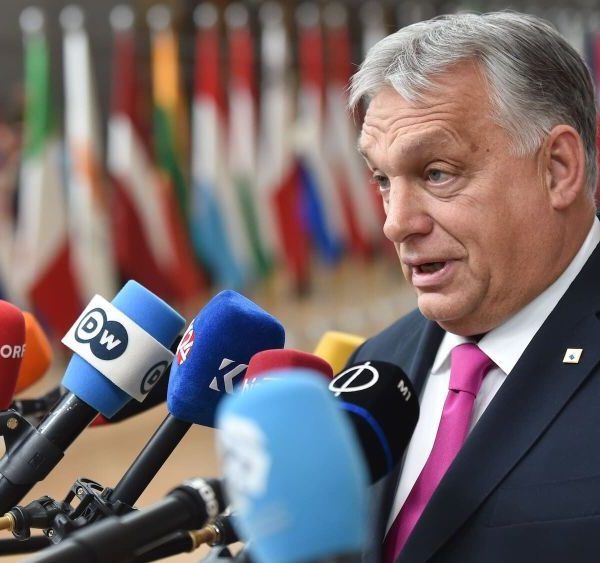
The Hungarian PM's 10-point plan is based on "realistic situation assessment, realistic objectives, and appropriate timing," Budapest explained
After concluding his 'peace mission' abroad, which involved meeting major leaders on both sides of the Ukrainian war, Hungarian Prime Minister Viktor Orbán has submitted his ten-point diplomatic plan to European Council President Charles Michel as well as every EU member state. His aim is to facilitate further discussion on how to reach a ceasefire agreement and avoid further unnecessary bloodshed in Ukraine and any possible global escalation.
The document, informally referred to as the "Orbán Plan," is based on the conclusions of the PM's bilateral meetings last week-including with Ukrainian President Zelensky, Russian President Putin, Chinese President Xi, Turkish President Erdogan, and former U.S. President Trump-and is suggesting a diplomatic roadmap that could lead first to a ceasefire agreement then, ideally, a lasting peace between Kyiv and Moscow.
"The plan is already on the desk of every EU prime minister," said Balázs Orbán, the premier's political director in an interview on Monday, July 15th. He said the plan involved,
Realistic situation assessment, realistic objectives, and appropriate timing-that is [Hungary's] approach.
The Hungarian mission's experiences abroad reinforced the idea that peace negotiations are hardly achievable without outside help. "We went everywhere with the aim of exploring how much and what chance there is for peace," Balázs Orbán said in the interview.
"The first peace mission was to the warring countries. It is clear that Ukraine and Russia are very determined to fight and without the entry of external mediators, we will unfortunately see very harsh destruction in the coming months. We then set out to negotiate with potential mediators. China and Turkey are committed to peace. And so is Donald Trump," the official explained. "But the Europeans and the current U.S. administration are in favor of continuing the war."
That was what drove PM Orbán to meet Trump at Mar-a-Lago, hoping that the former president's "likely" re-election would turn Washington toward a more peaceful course. In his note to Michel and the EU governments, Orbán warned that a Trump presidency would mean that the proportion of the financial burden of supporting Ukraine "will significantly change to the EU's disadvantage" if it does not adapt its policy as well.
At the same time, Orbán also noted that Trump plans to start working towards peace as soon as he's declared president-elect in November. According to Orbán, Trump "will not wait until his inauguration, but will be ready to act as a peace broker immediately. He has detailed and well-founded plans for this."
We continued the peace mission in Mar-a-Lago. President @realDonaldTrump has proved during his presidency that he is a man of peace. He will do it again! pic.twitter.com/8abVBW7f6r
- Orbán Viktor (@PM_ViktorOrban)
Despite most Europeans sharing Hungary's vision, Brussels seems the hardest to sway. Eurocrats and EU institutions-including the Commission itself-are currently trying to outdo each other in their efforts to boycott, discredit, and undermine the work of the EU Council's current Hungarian presidency, precisely because of its pro-ceasefire stance.
While Budapest has no illusions about the weight of Hungary in international diplomacy, it should not be underestimated either. "At the moment, Hungary is the only country that has up-to-date and concrete information on how the warring parties and the main potential mediators think and how to navigate between the different interests," Balázs Orbán said.
Even before Orbán's peace mission, Budapest had identified three key players (the EU, the U.S., and China) who are capable of, and are therefore crucial to, facilitating peace negotiations between Russia and Ukraine. "At least two, but ideally all three, need to adopt a pro-ceasefire stance," Péter Szijjártó, Hungary's foreign minister said recently.
Therefore, Hungary continues to push for EU support for peace as well, no matter how hopeless the fight seems. "Now our task is to put this new approach together and try to convince the EU member states of Viktor Orbán's plan." The PM's political director said. "We believe that the entire period of our country's EU Presidency should be used-in political terms-to lay the groundwork for peace negotiations."
While Brussels still acts as if the idea of peace negotiations with Russia was the biggest political sacrilege one can commit, attitudes are slowly changing even in Kyiv. President Zelensky recently repeating his earlier statement that he was ready to invite Moscow to the next tranche of peace negotiations later this year in Switzerland.
If Washington does indeed change course under a Trump-led White House, that leaves only the EU to finally start listening to reason. "If Europe wants peace, and wants to have a decisive say in settling the war and ending the bloodshed, then the change of direction must be worked out and implemented now.... If the EU does not act now, it may not be able to act later."
The #peacemission can play an important role in putting an end to the war in #Ukraine. pic.twitter.com/jiybQUwYth
- Balázs Orbán (@BalazsOrban_HU)
Original article: europeanconservative.com